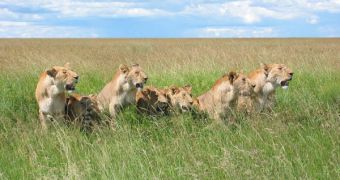According to a new research, it appears that lions do not form their basic type of social aggregation, the pride, in order to be more efficient hunters. They rather do it out of the necessity to defend a certain territory from other prides or individual lions that may be trying to get a “foothold” in an established area. Experts believe that the bigger the pride, the smaller the chances of other lions being able to penetrate a certain territory, or defeat the existing “rule.”
In the past, wildlife experts hypothesized that the main reason why lions got together was because they were drawn instinctively to it, so as to be better hunters. However, statistic correlations have proven the fact that there is no clear indicator that larger numbers of the creatures in any way affect the outcome of the hunt. That is to say, even lions or lionesses living in prides of one are regularly able to take care of themselves, hunting enough prey to survive.
Moreover, lions are the only members of the feline species to aggregate in social formations. This is unheard of in other species, so the explanations fell. The new study hints at the fact that the animals behave in very much the same way street gangs do, protecting their turf, and engaging in open confrontations with anyone that dares trespass. “The most important way to think about this is that lion prides are like street gangs. They compete for turf. The bigger the gang, the more successful it is at controlling the best areas. The main difference from humans is that these are gangs of female lions,” University of Minnesota in St Paul (UMSP) Ecologist Craig Packer explains.
“The advantage of large group size for group-territorial animals has been suspected for a long time, but had never been proven with data. With this paper, we were able to do just that because of the many groups studied over a long period,” UMSP Ecologist Anna Mosser adds, quoted by the BBC News. It also turns out that male lions play a much greater role in the pride than previously thought. “Males attack females from neighbouring prides, likely altering the balance of power in favour of 'their' females,” Packer says.

 14 DAY TRIAL //
14 DAY TRIAL //